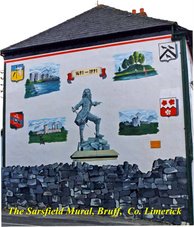The Kennedy visit to Bruff
JFK’s daughter, Caroline Kennedy, along with her husband Edwin Schlossberg, their three children, and other members of the extended family will visit Bruff on Friday.
The old courthouse in the town will be renamed after John F Kennedy’s great grandfather, Thomas Fitzgerald, who emigrated to the US from Bruff in 1852.
He took with him the family Bible, which was used for the swearing into office of JFK in 1961.
The visitors will see the site of the old Fitzgerald homestead on the Palatine Road.
The visit has been organised by Bruff Heritage Group. Spokesman Paul Dennehy said: "During Friday’s visit, we will dedicate and rename the former district court building the ‘Thomas Fitzgerald Centre’ to acknowledge the strong links between Bruff and the Fitzgerald Kennedy family. With this visit, every generation of the Fitzgerald Kennedys will have come to Bruff."
The centre will be used partly as a training site by Ballyhoura Development and will also be used as both an exhibition and heritage amenity.
Mr Dennehy said: "Caroline Kennedy is of course a lawyer and will be very interested to know that an important reform in the history of the Irish legal system was introduced as a direct result of an occurrence in the old Bruff courthouse in 1829 — the right of the Irish citizen to have legal representation was established and the practices of local magistrates in disallowing this was forbidden.
"So it is especially significant that she will be present in Bruff to dedicate this historical building to her ancestor."
After arriving in Amer-ica, Thomas Fitzgerald married Rosanna Cox from Cavan and one of their children, John "Honey Fitz" Fitzgerald, went on to become mayor of Boston, serving a number of terms in office.
Honey Fitz married his second cousin, Mary Hannon, whose family also came from Bruff. Their daughter was Rose Fitzgerald, born Jul 22, 1890.
Rose married Joe Kennedy in 1914 and one of their children was John F Kennedy — the 35th president of the US.
In 1908, John "Honey Fitz" Fitzgerald and Rose, then aged 18, visited Bruff and stayed in Shaughnessy’s Hotel on Main St for three days. During their stay, they visited the small farmhouse at The Pike, Bruff, where the Fitzgerald clan originated.
All that remains now is a model of the farmhouse, which was constructed in the early 1960s by a local artist who married into descendants of the Fitzgerald family.

